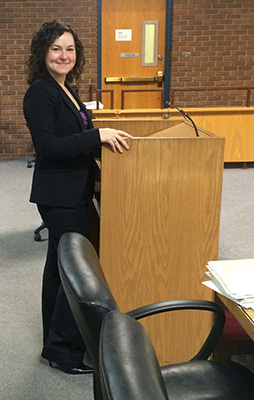Crown Prosecutor
submitted 2014
 "I took the long way to get to Augustana!" Danielle Fostey says with a smile. Eagerly on her way to law school, Danielle went to Calgary for her first year of university, but she wasn't happy there. "I didn't feel I could connect with any of the professors, and the classes were huge," she recalls. Danielle remembered that an Augustana recruiter had made a presentation to her Grade 12 class in St. Paul, AB. She phoned the recruiter, who put her in touch with Augustana's admissions staff, and Danielle transferred to Camrose for her second year. "It was the best decision I ever made," she says.
"I took the long way to get to Augustana!" Danielle Fostey says with a smile. Eagerly on her way to law school, Danielle went to Calgary for her first year of university, but she wasn't happy there. "I didn't feel I could connect with any of the professors, and the classes were huge," she recalls. Danielle remembered that an Augustana recruiter had made a presentation to her Grade 12 class in St. Paul, AB. She phoned the recruiter, who put her in touch with Augustana's admissions staff, and Danielle transferred to Camrose for her second year. "It was the best decision I ever made," she says.
As a Métis student, Danielle was grateful that Augustana's Aboriginal Students Office connected her with other Aboriginal students and with cultural resources-and offered her a way to give back to the community. Volunteering with the ASO, she did everything from making bannock to assisting with project planning, and she participated in the Aboriginal Student Mentor program, helping first-year Indigenous students make a successful transition to university life. "At Augustana, I was accepted for who I was, and the support I received as a Métis student was extremely helpful."
In 2010, Danielle graduated with Distinction and received an Eagle Feather at convocation. She went on to law school at Queens University, graduating in 2013. While completing a clerkship with the BC Supreme Court, Danielle realized she wanted to be a Crown Prosecutor. "It was a little bit of my natural inclination and a sum of all of my experiences," she reflects.
Now a Crown Prosecutor in Fort McMurray, Danielle's role is to prosecute charges that are laid by police after a crime has been committed. "My job is to be fair and to do what is in the public interest, so each file I look at requires me to think about not only what is legally important but what is fair and just."
The most difficult cases are those involving the victimization of children or other vulnerable people. "These cases are emotionally challenging," she says, "but they offer me opportunities to have the greatest impact. I try to make the court experience less scary for victims and to get them good results."
Danielle also finds her work rewarding when she can use her experience and discretion to offer an accused person community supports instead of punishment. "For example, when people are suffering from mental illness, I can refer them to seek help rather than imposing punishment on them."
Danielle considers her Métis heritage to be an asset in her career. "I understand colonial dynamics and the social issues facing Aboriginal people, both victims and accused. I am mindful of the history that brings them to the criminal justice system."
Augustana was the foundation. "I cannot say enough about how much I grew as a person," she reflects. "I learned so much from the people on campus - not only the professors who gave me a well-rounded education and taught me to think critically - but also people in student services who make Augustana such a welcoming place. Choosing Augustana was the best choice I ever made."